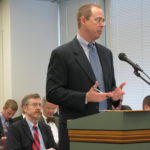KU students headed to trial over records related to business teacher with Koch ties
Attorneys dispute whether Art Hall is a public employee or private individual

Art Hall, director of the Center for Applied Economics at Kansas University, testifies to the House Tax Committee in this file photo from January 2010.
The Kansas University students who paid $1,800 for records regarding a KU business teacher with ties to Koch Industries won’t be getting them any time soon.
A judge Tuesday denied student Schuyler Kraus’ request to deem those records subject to the Kansas Open Records Act, which would allow KU to release them.
Instead — with Douglas County District Court Judge James McCabria saying more evidence is needed to resolve disputed facts — the case appears headed to trial, with the date set for November.
The most hotly disputed fact: Is Art Hall a KU — and thus public — employee, or a private individual?
Kraus’ attorney, David Brown, called the answer “stupidly simple.” Hall is a KU employee, and thus his university emails are subject to the Open Records Act and should be released, Brown said.
KU also considers Hall a KU employee, said Mike Leitch, an attorney for the university.
“I don’t know how you could reasonably conclude … that he does not work for KU,” Leitch said.
Hall teaches KU students, his office is at KU, his supervisor is a KU administrator, his paychecks are signed by KU, and he is executive director of the KU Center for Applied Economics, a public policy think-tank within KU’s School of Business.
However, questions lie in who ultimately funds Hall’s position — because money used to pay him is funneled through KU Endowment, a private entity — and how much that matters.
Hall’s attorney, Curt Tideman, argued Hall is a private individual and said that fact needs “further exploration” in a trial setting.
The Center for Applied Economics is “100 percent self-funded,” Tideman said. He said Hall’s job description states he must raise the money to support the Center and that funding comes through KU Endowment.
Also, Hall’s various duties at KU are not one and the same, Tideman said. Hall operates in at least three capacities: a lecturer, executive director of the Center for Applied Economics and a private individual.
“Where does one position start and the other end?” Tideman said.
•••
The three attorneys traversed broad legal and academic territory during Tuesday’s hearing.
Arguments addressed various subsections of the Kansas Open Records Act, precedent set by numerous Kansas and U.S. Supreme Court cases, the influence on the case of political views, First Amendment rights to free speech, personal versus business subject matter in emails and the issue of academic freedom.
The court case began in December, when Hall sued KU and the court agreed to block the university from releasing his emails pending further review.
Students for a Sustainable Future, a KU student club of which Kraus is president, had requested the emails along with records involving the hiring of Hall and two other business school teachers. KU gave some of the records to the students in November.
Students for a Sustainable Future is part of a network of groups nationwide attempting to investigate the influence that brothers Charles and David Koch, conservative activist billionaires who own Wichita-based Koch Industries, have on academia.
Previously Hall was chief economist for the Public Sector Group of Koch Industries Inc., which he has included in Center for Applied Economics publications. His economic philosophy is a market-based approach in line with the Kochs’, though no one at Koch Industries is telling him what to teach, he said in a previous interview with the Journal-World.
The Center for Applied Economics, established in 2003, was funded by contributions from the Fred C. and Mary R. Koch Foundation and other private donors, according to KU, the Journal-World previously reported. Foundation grants are made in line with university policies regarding hiring and curriculum, a representative told the Journal-World in December.
•••
Seeking to learn who Hall truly answers to was the reason Kraus sought his correspondence in the first place, Brown said.
“That’s why my client filed this request,” Brown said. “She believes he doesn’t work for KU when you really get down to it. He’s a shill for somebody else.”
A university spokesman said he was unable to confirm, late Tuesday afternoon, whether KU intends to pursue the case to trial.
Brown, who has represented Kraus largely pro-bono, was appearing on a limited basis and is now withdrawn from the case.
“Ms. Kraus simply cannot afford a protracted court battle to protect her rights,” he said. “At this point, I believe she will attempt to move forward by representing herself.”
Brown added: “We are confident, however, that the university will fight the finding that Mr. Hall is a private person rather than a university employee. Then, we hope the court will be able to rule that the records should be released.”
Previous coverage
- May 27, 2015: ‘Companies Cannot Buy State Employees,’ says KU in open records case involving teacher with Koch ties
- May 13, 2015: KU business teacher calls students’ records request politically motivated, malicious
- April 21, 2015: Student’s motion in Hall v. KU case trumpets ‘academic transparency’
- Feb. 9, 2015: KU, students answer lawsuit by business school teacher formerly employed by Koch
- Dec. 4, 2014: Under scrutiny for Koch connection, KU director sues over records; judge blocks release
- Dec. 3, 2014: Students receive part of $1,800 records request seeking Kochs’ influence on hiring at KU
- Sept. 23, 2014: KU students raise funds to pay for records request







